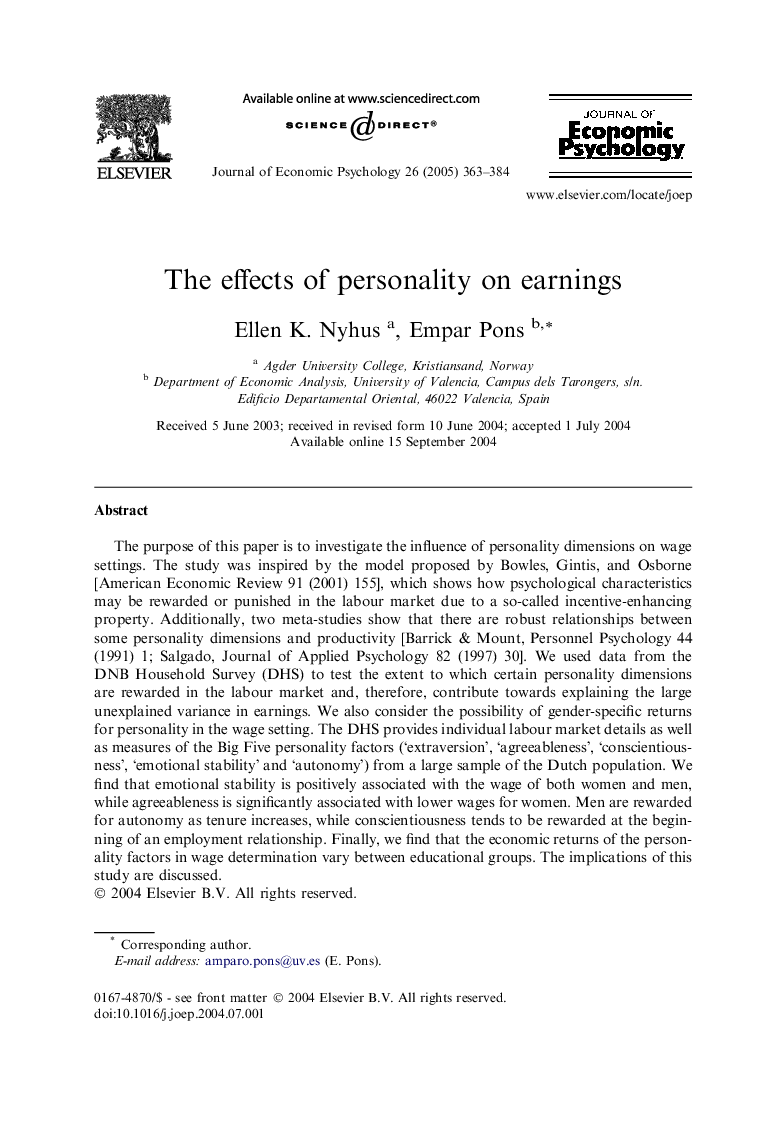| کد مقاله | کد نشریه | سال انتشار | مقاله انگلیسی | نسخه تمام متن |
|---|---|---|---|---|
| 10438298 | 912678 | 2005 | 22 صفحه PDF | دانلود رایگان |
عنوان انگلیسی مقاله ISI
The effects of personality on earnings
دانلود مقاله + سفارش ترجمه
دانلود مقاله ISI انگلیسی
رایگان برای ایرانیان
کلمات کلیدی
موضوعات مرتبط
علوم انسانی و اجتماعی
مدیریت، کسب و کار و حسابداری
بازاریابی و مدیریت بازار
پیش نمایش صفحه اول مقاله

چکیده انگلیسی
The purpose of this paper is to investigate the influence of personality dimensions on wage settings. The study was inspired by the model proposed by Bowles, Gintis, and Osborne [American Economic Review 91 (2001) 155], which shows how psychological characteristics may be rewarded or punished in the labour market due to a so-called incentive-enhancing property. Additionally, two meta-studies show that there are robust relationships between some personality dimensions and productivity [Barrick & Mount, Personnel Psychology 44 (1991) 1; Salgado, Journal of Applied Psychology 82 (1997) 30]. We used data from the DNB Household Survey (DHS) to test the extent to which certain personality dimensions are rewarded in the labour market and, therefore, contribute towards explaining the large unexplained variance in earnings. We also consider the possibility of gender-specific returns for personality in the wage setting. The DHS provides individual labour market details as well as measures of the Big Five personality factors ('extraversion', 'agreeableness', 'conscientiousness', 'emotional stability' and 'autonomy') from a large sample of the Dutch population. We find that emotional stability is positively associated with the wage of both women and men, while agreeableness is significantly associated with lower wages for women. Men are rewarded for autonomy as tenure increases, while conscientiousness tends to be rewarded at the beginning of an employment relationship. Finally, we find that the economic returns of the personality factors in wage determination vary between educational groups. The implications of this study are discussed.
ناشر
Database: Elsevier - ScienceDirect (ساینس دایرکت)
Journal: Journal of Economic Psychology - Volume 26, Issue 3, June 2005, Pages 363-384
Journal: Journal of Economic Psychology - Volume 26, Issue 3, June 2005, Pages 363-384
نویسندگان
Ellen K. Nyhus, Empar Pons,